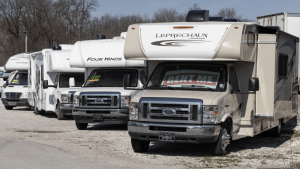Finding a spot to park an RV to live in long-term can be challenging. Finding a good spot is even harder!
In this comprehensive guide, we’ll explore various options for long-term RV parking, including:
Plus, provide tips to help you find the perfect spot for each of these options.
1. Private Land

Owning or renting private land is an attractive option for RV living. Options include parking your RV on your own land, on a friend’s or family member’s land, or purchasing an RV lot through a website like RV Property.
Private land, especially your residence, provides more freedom and flexibility but may require additional research to ensure you comply with local regulations and zoning laws. See Is It Legal To Live In A Camper In Your Backyard for more information.
Here are a few tips for finding private land for your RV:
- Search online listings, such as RVProperty.com (mentioned above), Craigslist, or local classifieds.
- Network with friends, family, or online RV groups to find available land.
- Contact local real estate agents or land brokers for leads on suitable properties.
- Check local zoning laws, building codes, and property covenants before parking your RV.
2. Public Land

Some national parks, national forests, and Bureau of Land Management (BLM) areas offer volunteer opportunities as campground hosts. In exchange for your services, you’ll have a free place to park your RV during your stay.
For example, the BLM utilizes camp hosts at their Egin Lake Campground in Idaho Falls, Idaho. They even give a stipend for living expenses!
Here are some tips for finding public land opportunities:
- Visit websites like Volunteer.gov or the National Park Service to find volunteer campground host positions. Volunteer.gov showed 130 camp host opportunities available across the country at the time of publishing.
- Reach out to your local BLM office for information on available opportunities.
- Keep in mind that volunteer opportunities may be seasonal, and you’ll likely need to commit to a specific time frame.
3. Campgrounds

Campgrounds are one of the most popular places to park your RV to live. Campgrounds offer a variety of amenities, such as hookups for electricity, water, and sewer, as well as access to showers, laundry facilities, and other conveniences. Campgrounds also offer a sense of community, as you will be surrounded by other RVers.
However, not every campground will allow for long-term parking, so it’s important to research campgrounds in your desired area for long-term availability and to ensure they have the amenities you need.
To find campgrounds suitable for RV living, follow these tips:
- Use online resources like Campendium, Allstays, or ReserveAmerica to search for campgrounds.
- Read reviews and ratings from fellow RVers to ensure the campground fits your needs.
- Call ahead to inquire about long-term stay options and availability.
- Consider joining an RV club or association, like Escapees or Good Sam, for access to discounted rates and member-exclusive campgrounds. See my 7 favorite RV memberships and clubs to help you find the best one(s) for you.
4. RV Parks
RV parks are a great option to live full-time as you’ll have access to amenities you typically wouldn’t find at any other option on this list.
RV parks and resorts are similar to campgrounds but specifically designed for RVs. They typically have larger spaces, more amenities, and more services tailored to RVs. Plus, they offer a sense of community, as you will be surrounded by other RVers.
Many RV parks offer monthly or seasonal rates, making them an excellent option for long-term RV living.
To find the right RV park for your needs, follow these tips:
- Use online resources like RV Life Campground Reviews or RoverPass to search for RV parks.
- Read reviews and ratings from fellow RVers to ensure the park meets your expectations.
- Call ahead to inquire about long-term stay options, rates, and availability.
- Network with fellow RV enthusiasts on forums, social media groups, or at RV shows to learn about their favorite RV parks.
Check out our full guide on how to find long term RV parks.
5. Mobile Home Parks
Mobile home parks offer another option for legal RV living. Many of these parks have designated spaces for RVs and provide similar amenities to RV parks, such as hookups and laundry facilities.
Here are some tips for finding mobile home parks that welcome RVs:
- Search online directories like MHVillage to find mobile home parks in your desired area.
- Call or visit the park’s website to confirm they accept RVs and inquire about long-term stay options.
- Read reviews and ratings from current and former residents to gauge the park’s suitability for your needs.
- Be prepared to abide by any park rules and regulations, which may differ from those of a typical RV park.
Whether you prefer the privacy of private land, the adventure of public land, the community feel of campgrounds, the amenities of RV parks, or the stability of mobile home parks, there’s a perfect spot to park your RV long-term.







I work in Oakbrook, Il and buying a camper trailer to live in year round. Need to find a lot or property to put it on and live there. I have two cats that will be with me.